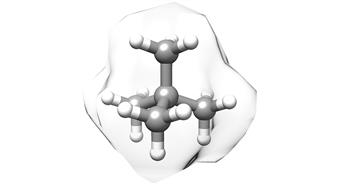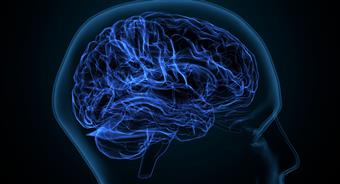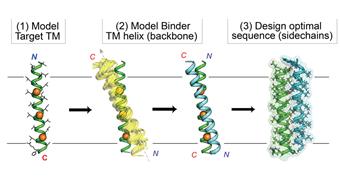
Human antibody that targets carfentanil, fentanyl and related opioids reverses overdose effects in preclinical study Scripps Research-developed antibody therapy appears to have advantages over existing opioid-overdose treatments.
August 07, 2023
LA JOLLA, CA An antibody in single-chain fragment variable (scFv) format that binds to the powerful opioid carfentanil was shown to reverse signs of carfentanil overdose in preclinical tests conducted by scientists at Scripps Research.
Carfentanil is a variant of the synthetic opioid fentanyl, and about 100 times as potent as its chemical cousin. Along with fentanyl and other fentanyl variants, it is commonly mixed with illegal drugs such as heroin and cocaine to enhance their euphoric effects, resulting in many fatal overdoses.
In the study, published in ACS Chemical Neuroscience on August 3, 2023, the researchers developed a human antibody that binds very tightly to carfentanil, fentanyl and other fentanyl variants. In rodents, they showed that administering a solution of the antibody shortly after an overdose reverses the potentially deadly respiratory depression caused by carfentanil, the most dangerous of the variants. The results suggest that the antibody could be a more powerful, longer-lasting treatment for synthetic opioid overdose, compared to existing options.
We expect this antibody to be a valuable new weapon for fighting the opioid crisis, says study senior author Kim D. Janda, PhD, the Ely R. Callaway, Jr. Professor of Chemistry at Scripps Research.
The study's first author was Lisa Eubanks, PhD, a senior staff scientist in the Janda laboratory.
Opioid drugs, whether synthetic or derived from the opium poppy, bind and activate neuronal receptors called mu-opioid receptors. These receptors are present on different types of neurons across the human nervous system, which is why opioid drugs have multiple effects like pain-relief and euphoria, but also respiratory depression slower and shallower breathing. Respiratory depression is the immediate cause of death in the tens of thousands of fatal opioid-related overdoses that occur each year in the U.S.
Carfentanil, after fentanyl, is the next-most common synthetic opioid found in illicit drugs in the U.S. Once available legally as a tranquilizer for large animals, it was pulled from the market by the FDA in 2018 because of its potential for misuse and its potential lethality at doses measured in micrograms. Carfentanil is so potent that the U.S. government regards it as a possible chemical warfare agent; the Janda lab's early work on the new antibody was funded in part by a National Institutes of Health program aimed at finding antidotes to such weapons.
Fentanyl and carfentanil overdoses currently are treated with the mu-opioid receptor-blocking drugs naloxone and naltrexone, but these treatments are sometimes ineffective against synthetic opioids even at large doses. Moreover, the benefits of these treatments typically last for less than an hour after dosing potentially allowing respiratory depression from fentanyl or carfentanil (which persist much longer in the body) to resume.
Janda and his team set out to develop an anti-fentanyl antibody that would have three basic features: firstly, it should bind with very high affinity to fentanyl and its derivatives, pulling them out of the bloodstream and thereby causing them to diffuse out of the brain as well; secondly, it should persist in the body so as to provide reasonably long-term protection; and thirdly, it should be able to get quickly into the bloodstream and be delivered by a simple intramuscular injection, which requires no special training.
To obtain antibodies, Janda and his team vaccinated rodents with a molecule they designed that would elicit antibodies against carfentanil, fentanyl and variants. The rodents were engineered to produce human antibodies (rather than rodent antibodies, which would trigger an unwanted immune response if administered to humans). Among the resulting antibodies, the researchers were able to identify several that bind to carfentanil with super-high affinity and bind very strongly to fentanyl and several other fentanyl derivatives. They then selected the most potent of these antibodies, modified it to be more lightweight (so that it would get quickly into the bloodstream), and further altered it so it would persist in the blood for days.
Tests in rodents showed that the optimized scFv, dubbed C10 S66K, did indeed have a powerful effect at reducing carfentanil's actions on the brain reversing carfentanil-driven respiratory depression when injected 15 minutes after a heavy carfentanil exposure. The effect after about 40 minutes was stronger than naloxone's and was still increasing after two hours, whereas naloxone's peaked at 30 minutes and swiftly declined.
As part of the study, the collaborating laboratory of Ian Wilson, PhD, Hansen Professor of Structural Biology at Scripps Research, used X-ray crystallography to determine the near-atomic resolution structures of carfentanil- and fentanyl-bound C10 S66K. These structural data suggest that the antibody should indeed bind well to multiple fentanyl derivatives but should not interfere with the activity of other beneficial opioid molecules such as naloxone and naltrexone.
Janda and Scripps Research have licensed the rights to further develop and market C10-S66K to the pharma company Cessation Therapeutics, the sponsor of the clinical trial planned for this month. The U.S. Food and Drug Administration (FDA) has approved a full length IgG version of this antibody termed CSX-1004 for clinical trials, slated to begin this month for the prevention of fentanyl overdose.
An Engineered Human-Antibody Fragment with Fentanyl Pan-Specificity that Reverses Carfentanil-Induced Respiratory Depression was co-authored by Lisa Eubank
More from Scripps
20/04/2024
New copper-catalyzed C-H activation strategy from Scripps Research Two-mode reactions inspired by human detox enzymes offer powerful new tools for drug discover...
12/04/2024
Scripps Research chemists devise easier new method for making a common type of building block for drugs Scientists transform simple linear amines into saturated...
06/04/2024
A simple, inexpensive way to make carbon atoms bind together A Scripps Research team uncovers a cost-effective method for producing quaternary carbon molecules,...
04/04/2024
Developing a vaccine for the zombie drug xylazine Scripps Research chemical biologists design an early proof-of-concept vaccine that could lead to the first...
30/03/2024
How blocking a neural receptor responsible for addiction could reduce alcohol use A Scripps Research team found that a new therapeutic that targets the kappa op...
13/03/2024
New computational strategy boosts the ability of drug designers to target proteins inside the membrane Customized-design approach could streamline the design of...
29/02/2024
Scripps Research scientists reveal how first cells could have formed on Earth New phospholipid discovery brings researchers closer to understanding how primordi...
29/02/2024
How molecular handedness emerged in early biology Scripps Research chemists fill a major gap in origin-of-life theories.
February 28, 2024
LA JOLLA, CA Mole...
22/02/2024
Snaking toward a universal antivenom Scripps Research scientists discovered antibodies that protect against a host of lethal snake venoms.
February 21, 2024
...
06/02/2024
Calibr-Skaggs announces expansion of option and license agreement with AbbVie to develop novel cell therapies for solid tumors and autoimmune diseases
AbbVie...
26/01/2024
Re-energizing mitochondria to treat Alzheimer's disease Scripps Research team restored neuron-to-neuron connections in human cells.
January 25, 2024
LA JO...
24/01/2024
100 years of Science Changing Life: Scripps Research celebrates a century of transforming human health For the last century, institute leaders and renowned scie...
23/01/2024
New technology lets researchers track brain cells' off switches The method could shed light on what goes awry in numerous brain conditions when neurons ar...
09/01/2024
Three decades of giving: Announcing the Calibr-Skaggs Institute for Innovative Medicines The ALSAM Foundation, founded by the Skaggs family, provides lasting g...
04/01/2024
Life science entrepreneur Gene Lay joins Scripps Research Board of Directors Lay, founder of the global biotech company BioLegend, brings invaluable experience ...
21/12/2023
Taming a plant-derived toxin Scripps Research team modifies the traditional poison picrotoxinin for potential neurological drugs and anti-parasite treatments. ...
19/12/2023
Scripps Research Executive Vice President Eric Topol gives TED talk on transformative power of AI in medicine Topol provides an overview of how AI models can i...
13/12/2023
New AI-powered algorithm could better assess people's risk of common heart condition Early detection of atrial fibrillation can reduce the risk of stroke an...
07/12/2023
Nanoparticle flu vaccine design shows promise in early tests Scripps Research-designed vaccine could provide broad, enduring protection against influenza A str...
16/11/2023
Numerous Scripps Research scientists named Highly Cited Researchers Clarivate's annual, global list represents researchers who have demonstrated significant...
07/11/2023
Multiple sclerosis drug invented at Scripps Research slows long-term devastating disease progression Late-breaking data reinforces the effectiveness and safety ...
05/10/2023
Keren Lasker named a 2023 Moore Inventor Fellow The prestigious award will support Lasker's inventive research in membraneless organelles and their applica...
22/09/2023
Michael Bollong named a 2023 Amgen Young Investigator The prestigious award will support Bollong's research identifying new molecular targets and therapeuti...
09/09/2023
Philip Dawson receives 2024 American Chemical Society National Award Dawson is honored with the Arthur C. Cope Late Careers Scholar Award for his foundational c...
07/09/2023
Scripps Research chemists devise a method for C-H activation of alcohols The method represents a new toolkit for making drugs and other compounds.
September 06...
31/08/2023
Scripps Research receives $1.5M to surveil infectious disease threats in wastewater Bill & Melinda Gates Foundation award to support the development of multi-pa...
16/08/2023
How cold temperatures trigger the brain to boost appetite Scripps Research scientists' discovery could lead to new weight loss and metabolic health treatmen...
08/08/2023
Human antibody that targets carfentanil, fentanyl and related opioids reverses overdose effects in preclinical study Scripps Research-developed antibody therapy...
04/08/2023
How sensory neurons impact the gut Scripps Research scientists show that the receptor PIEZO2 in sensory neurons controls gut motility and transit time, which a...
26/07/2023
AbbVie and Calibr Expand Strategic Collaboration to Advance Several Preclinical and Early-stage Clinical Assets The expanded strategic collaboration will advan...
23/07/2023
Scripps Research scientists develop AI-based tracking and early-warning system for viral pandemics Machine-learning system effectively predicts emergence of pro...
19/07/2023
Monitoring T cells may allow prevention of type 1 diabetes Scripps Research study shows that analyzing T cells in blood samples could be used to select at-risk ...
19/07/2023
Scripps Research mourns passing of leading organic chemist Albert Eschenmoser Eschenmoser pioneered key reactions in synthetic chemistry and shaped the understa...
15/06/2023
Scripps Research awarded $46.8 million by NIH to promote human health through innovative translational science and training The Translational Institute is harne...
13/06/2023
Scripps Research's Danielle Grotjahn named 2023 Pew Scholar in the Biomedical Sciences The award will support Grotjahn's study of how cells assemble the...
31/05/2023
Crossing the ring: new method enables C-H activation across saturated carbocycles Scripps Research chemists add another powerful tool to their molecular editin...
24/05/2023
Scripps Research develops behind-the-scenes tool for better biomedical data discovery The new resource makes datasets more discoverable for life science communi...
19/05/2023
Scripps Research neuroscientist Hollis Cline elected to American Academy of Arts and Sciences Cline is recognized for her discoveries about the role of sensory ...
19/05/2023
Scripps Research's Skaggs Graduate School awards doctoral degrees to 31st graduating class Commencement ceremony will be livestreamed via Zoom and on instit...
13/05/2023
A better route to benzocyclobutenes, sought-after building blocks for drugs Scripps Research chemists devise a new, C-H activation-based method for the synthesi...
09/05/2023
Renowned Scripps Research professor Jeffery Kelly elected to National Academy of Sciences Kelly's groundbreaking work on protein misfolding has led to thera...
28/04/2023
Mirror-image molecules pave new path for cancer drug discovery By comparing how mirror image versions of small molecules impact clusters of proteins, Scripps R...
22/04/2023
How alcohol consumption contributes to chronic pain A Scripps Research team showed how both alcohol intake and alcohol withdrawal can lead to increased pain and...
21/04/2023
Xin Jin receives dual awards to study autism risk genes in neurodevelopment Major grants from the National Institutes of Health and California Institute for Reg...
20/04/2023
Trim the sugar: New HIV vaccine design improves immune response Scripps Research vaccine candidate headed for clinical trials.
April 19, 2023
LA JOLLA, CA A...
18/04/2023
Therapeutic can seek and destroy potent opioid to treat overdoses Scripps Research chemists developed a new biologic to work against the synthetic opioid carfen...
07/03/2023
How heavy alcohol consumption increases brain inflammation The findings by a Scripps Research team point toward a potential new drug target for treating alcohol...
02/03/2023
Scientists find human antibodies that can block multiple coronaviruses including SARS-CoV-2 Results from a Scripps Research and UNC team pave the way for a vacc...
28/02/2023
$10 million grant funds Scripps Research Alcohol Research Center through its 50th year The five-year grant supports research into the neurobiology of alcohol us...
28/02/2023
Immune system drug shows promise in treating alcohol use disorder, a Scripps Research clinical trial reports Scientists at Scripps Research found that apremilas...
 Human antibody that targets carfentanil, fentanyl and related opioids reverses overdose effects in preclinical study Scripps Research-developed antibody therapy appears to have advantages over existing opioid-overdose treatments.
Human antibody that targets carfentanil, fentanyl and related opioids reverses overdose effects in preclinical study Scripps Research-developed antibody therapy appears to have advantages over existing opioid-overdose treatments.























